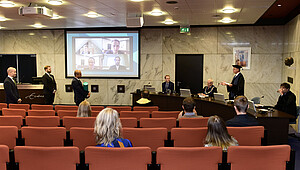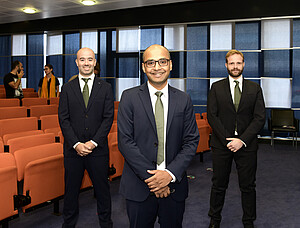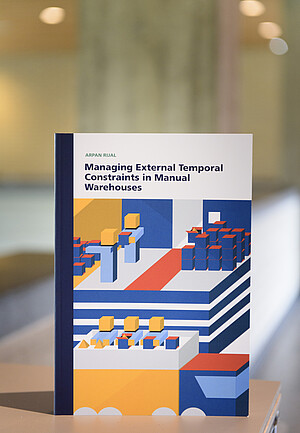PhD Defence Arpan Rijal

In his dissertation 'Managing External Temporal Constraints in Manual Warehouses’, Arpan Rijal studies the impact of external temporal constraints in three operational planning problems at manual warehouses. By develop mathematical models for the problem, this dissertation proposes solution approaches for them and conducts computational experiments to derive insights. Arpan Rijal defended his dissertation on Friday, 04 September 2020 at 13:30h. His supervisors were Prof. dr. M.B.M. de Koster (EUR) and Dr M. Bijvank (EUR). Other members of the Doctoral Committee are Prof. dr. Asvin Goel (Kühne Logistics University), Prof. dr. Albert Wagelmans (EUR), Prof. Dr. Nils Boysen (Friedrich-Schiller-Universität Jena), Dr Ioannis Fragkos (EUR), Dr Marie Schmidt (EUR) and Dr Remy Spliet (EUR).
About Arpan Rijal

Arpan Rijal was born in Sarlahi, Nepal on May 12, 1989. He holds a dual Bachelor's degree in Economics and Mathematics, summa cum laude, from St. Peter's University, USA and Master's degree in International Logistics from Jacobs University, Bremen, Germany. In January 2015, he joined the Technology & Operations Department at Rotterdam School of Management for his doctoral studies.
His research interests revolve around optimization of warehousing and transportation processes. His research findings have been presented at international conferences such as INFORMS Annual Meeting, POMS Annual Meeting, International Conference on Computational Logistics and International Symposium on Scientific Logistics.
Currently, Arpan is a Post Doctoral Fellow at the Department of Operations at University of Groningen.
Thesis Abstract

Most of the warehouse operations are still performed manually despite the increasing development and adoption of automated warehouse solutions. Planning human workers in a warehouse is a complex task because managers have to consider issues such as start and end times of shifts, breaks, and incentive payment schemes. When warehouses have temporal restrictions on the processing time of inbound trucks or when they have deadlines for outbound orders, these constraints impact the schedules and cost of employing human workers. In this environment, warehouse management has to consider the temporal restrictions from external entities as well as the limited resources available at the warehouse. In this thesis, we study the impact of external temporal constraints in three operational planning problems at manual warehouses. We develop mathematical models for the problem, propose solution approaches for them and conduct computational experiments to derive insights.
The first study in the dissertation explores integrated scheduling and assignment of trucks to dock doors in unit-load cross-dock facilities with mixed mode dock doors. The processing time of both inbound and outbound trucks at the cross-dock are constrained by time windows. In the second study, we investigate order picker scheduling problem in distribution centers where order picking operations are constrained temporally by predefined time windows for delivery of orders to the staging area of the warehouse. In the final study, we consider the impact of delivery time windows at customers on the capacity requirements of three warehouse processes – order picking, staging and loading.
Photos: Michelle Muus


